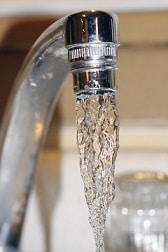
Drinking water in order to stay hydrated is very important because dehydration causes many problems, including a dry mouth, thirst, fatigue, headaches, decreased sweating and urination, increased heart rate, muscle cramps, vomiting, low urine volume, and more.
Drinking water may also be causing you allergy problems though, as reported by various studies. Food allergies have risen sharply over the past 20 years; between 4-6% of children are affected and between 1-2% of adults.
According to a study by the American College of Allergy, Asthma and Immunology, published in the Annals of Allergy, Asthma and Immunology in the December 2013, the culprit may be chemicals called dichlorophenols. Dichlorophenol is added to drinking water in order to chlorinate it.
The study found that individuals with the highest levels of dichlorophenols in their urine were 80% more at risk for developing a food allergy.
Elina Jerschow, M.D., M.Sc., said Our research shows that high levels of dichlorophenol-containing pesticides can possibly weaken food tolerance in some people, causing food allergy. This chemical is commonly found in pesticides used by farmers and consumer insect and weed control products, as well as tap water.
There has also been a rise in allergies in the UK in recent years, where it is reported that up to 10 million adults claim to be unable to eat a variety of foods due to allergic reactions. Studies in the UK suggest that around 4% of British children have food allergies. These food allergies present in the form of eczema or an itchy rash or a sudden-onset life-threatening reaction known as anaphylactic shock.
Quite a lot of the drinking water supply in the UK is chlorinated to kill germs, although apparently at lower levels than in the US. There are also various household products that contain dichlorophenol. Triclosan, which can be found in face washes, kitchen utensils, lipsticks, and toothpaste is an anti-bacterial that can break down to form dichlorophenol.
One way of ensuring that you are drinking water that is free of toxins is to invest in a home water and an office water cooler. There are bottled water coolers and mains water coolers:
A Bottled Water Cooler is a unit that comes with a bottle of water that in placed upside down on the top of the unit; water is then dispensed via a tap or faucet which can be opened via a button or a lever, depending on which style of office water cooler or home water cooler you have. Bottled water coolers are more suited to smaller offices and to homes as they have a finite amount of water available – once the bottle has been tapped dry it needs to be replaced. The water in these water coolers is chilled and free of toxins as most water coolers have an inbuilt water filter. Some water companies such as Living-Water offer bottled water coolers that are filled with spring water direct form source in the Wentlock range. This water is pure and tastes wonderful, and is guaranteed not to give you any allergies.
A Mains Water Cooler, otherwise referred to as a POU water cooler is plumbed into your main water line so there is no need for bottles. Mains water coolers are more suited to high traffic areas as they can dispense chilled water virtually 24/7. Some models can be fitted with a water filter directly at the connection to the main water pipe to ensure that any foreign bodies or toxins are filtered out long before the water gets anywhere near your glass.
Make sure that the water you are drinking is pure and will not give rise to allergies in either you or any of your loved ones by investing in a water cooler. Purchasing a water cooler for your home and office is investing in your health.
Source:





